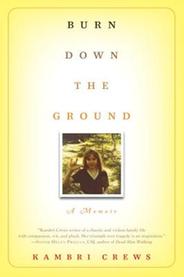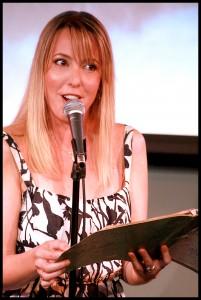
New York producer and publicist Kambri Crews always knew that her childhood was unusual--she spent much of it in a tin shack deep with her family in the woods of Texas. But when, in her early 30s, her charismatic and adored father was sentenced to 20 years in prison for stabbing his girlfriend, she had to confront for the first time his violent, destructive behavior. The title of Crews's memoir, Burn Down the Ground, refers to the agricultural technique of slash and burn, and it's aptly named. More than once she's had to torch it all and start over.
Besides growing up in an isolated area, as the child of deaf adults, you were required to take on some adult responsibilities, like translating for your parents. How do you think that shaped you as a person?
Well, you definitely develop a lot of self-reliance and independence, and you learn to think for yourself at a younger age, which isn't a bad quality, especially for a young girl. It's changing now, but girls aren't necessarily taught to be as self-sufficient as boys. I always felt capable of doing anything I wanted, because I already knew how. Even if I didn't really know, I knew it wouldn't take much to learn. That's one of the best qualities I got from having deaf parents and deaf grandparents--learning how to live on my own and take care of myself.
Do you think that better equipped you to deal with the traumas later in your life?
It's not the best feeling in the world to know you don't really have anybody to fall back on, but it sure makes you try really hard to not fail.
I don't think it helped as far as the trauma. My mom's tendency to pretend everything was normal--that's what I started to do. That's why, when my dad attacked this other woman, for the first time I was truly like, let's talk about this. We can't just continue to pretend like everything's normal. It's not normal. It's never been normal. So that got me through the early trauma when I was a teenager--don't ask, don't tell. It's a defense mechanism that worked, but it didn't necessarily lead to healing.
What do you think made you able to move forward?
A sense of humor. I know that's what lead me to work in comedy. And my dad has a great sense of humor. So do my mom and brother, and the deaf community is all about storytelling. It's a very social group of people. The ability to make light and laugh has gotten me through a lot.
 Could you talk a bit more about how growing up in the deaf community influenced you as a storyteller?
Could you talk a bit more about how growing up in the deaf community influenced you as a storyteller?
Sign language is not a written language. The great majority of conversations and storytelling happen in person, and to convey the nuance of words and meaning and emotion, you really need to express it in your face and in your body. When I'm on stage telling stories and I use sign language my friends always say, "I loved the story but I really loved it when you used sign language, because you use your whole body."
Was it a struggle translating this in-person storytelling to the page?
It was actually very useful tool. Recently I saw some tips for writers on Judy Blume's website, and she suggests saying things out loud. I would tell my stories on stage at this little place called Ochi's Lounge, a 50-seat theater I created, then I'd come home and transcribe the show. Or I'd work on a chapter and then read it [at the show]. When you say things out loud, you recognize what doesn't sound right, and you can find where the humor is a lot easier.
Why write a memoir?
It's one thing to know that you have this weird life, but what is the real message? I didn't want to write from anger, because I'm not angry and I don't think anyone would want to read a memoir filled with bitterness. For me, the important part was to show that people are complicated, and love is complicated, and families are complicated. There are millions of people in jail in the U.S., and a lot of them are fathers and mothers. There are people out there who love them. When you really start to pull back the curtain on people, you can see why they landed in jail. If you can get to the root of those things, you can maybe prevent [some] crime. With my father, there were many times things could have gone differently for him. I don't want to blame the world--he's at fault for his own actions--but there were opportunities to help put him on a better track that were passed.
Also, with domestic violence, the more you talk about it, the less likely people are to remain silent. And that's where healing starts: talking about it. --Kelly Faircloth, freelance writer

